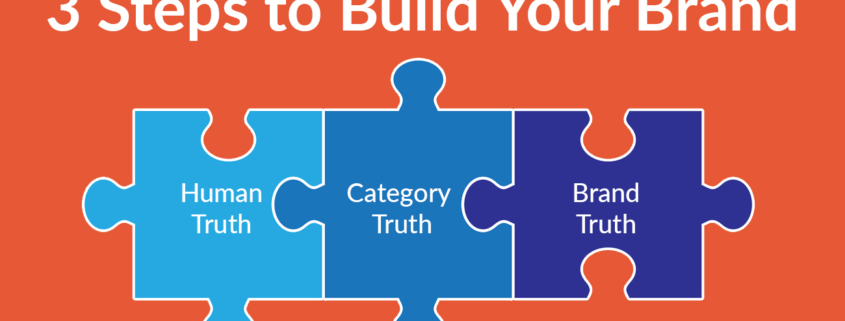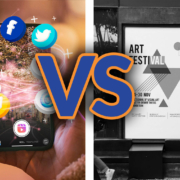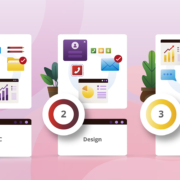The 3 Key Pieces of Building a Brand That No One Is Talking About
There seems to be a disconnect between how most people believe a brand is built vs how to actually build a brand. Many small business owners believe that they just need to determine a company name, make a logo, and then call it a day. This could not be further from the truth of how to build a brand effectively.
Big brand names like Apple, McDonald’s, Starbucks, Coca-Cola, and Nike didn’t become the powerhouses of their industries just because they decided that they were going to be the “cooler” companies. Companies like this understand brand building. Their marketers understand that your brand is not whatever you want it to be: your brand is how your consumers perceive you. But how do you get them to perceive your brand’s message the right way and make a good first impression?
Building a strong brand requires much, much more research and careful thought than you may think. For starters, you need to understand your consumers. You cannot develop a strong brand if you do not understand your target audience. You need to understand the competitors in your industry — and brand positioning. Once you understand all of that for your company, you can focus on visual identity, brand voice, persona, etc.
Understanding all of the core concepts of how to build a brand can be summarized into three main truths: the Human Truth, the Category Truth, and the Brand Truth.
1. Human Truth
The Human Truth, as the name suggests, is all about people. More specifically, it’s about your customers. In order to start brand building, you need to know your customers inside and out. Figure out exactly who is looking for what you’re selling. To do this, you need to follow two important steps: customer research and creating ICPs.
Research Your Consumers
Perform thorough and extensive research on your customers so you can build your brand based on your target market. What are the demographics of your customer base? What are their common likes and dislikes? Do they have any specific pain points to take note of? Questions like these, as well as many more, are important to answer about your consumers. Perform thorough research to find these answers so you can reap the benefits.
Create ICPs
An Ideal Customer Persona (ICP) is your “model customer.” Create your ICPs based on the information you gathered during your customer research, and decide on your ICP’s key traits. If you notice that over 90% of your most loyal customers are female, you would be wise to make your ICP a female as well. If your customers tend to be affluent, you would determine that your ICP has a larger salary. Start by putting together a list of clear traits that your ICP needs to have, then brainstorm. Delve into what the data leads you to believe about their personality. You may be surprised at how some traits that seem unrelated to your products/services can actually have a big impact on how the customer perceives you, so if anything jumps out at you from your research, take note of it.
2. Category Truth
Now that you understand your consumers and have your ICP set up, it’s time to look at the landscape that surrounds you: the industry and your competitors in it. That is what the Category Truth is all about.
Understanding Your Competition
A massive part of understanding brand building is understanding the companies you’re competing with. Market research provides you with a plethora of information that you can use to see where your competitors and yourself stack up and how your brand should reflect what you do better. Remember to not only focus on direct competitors but also on indirect competitors and competitive alternatives.
When researching your competitors, do not look at what they do well as something that you should also be doing. Look at what they fail to do well and fill in the gaps. Differentiation is the key to a strong brand identity.
Determine Positioning
Once you have finished researching and analyzing your competitors, look towards yourself and how you fit in the industry landscape. How can you position yourself in this market? Positioning is a massive part of your brand, and because of that, you need to take time to create your positioning statement. Tell the public who you are, what your product does, and your value proposition.
3. Brand Truth
Now that you understand your customers, your competitors, and where your small business belongs in your industry, it’s finally time to define your brand. You should already have a good idea of what your brand is by the time you have reached the Brand Truth — and how to best present this brand image.
Explain Who You Are
Now that you have arrived at the Brand Truth, you need to explain to your potential customers who you are. One great way to do this is with your brand story. Your brand story is the narrative of how your company started — and why. Stories help form an emotional connection between the brand and the consumer as well.
You also need to determine your mission statement. Your mission statement serves as your brand purpose; it’s just a brief couple of sentences explaining what your company sets out to achieve. Your company’s mission can help consumers connect better with your brand if it is something that they value. This plays into your brand values: what you choose to hold in high regard as a company and view as important. If people share similar values to your brand, they are more likely to choose you over a competitor.
How Will You Behave?
Brands are much like people; successful brands have strong brand character. Your brand personality plays a big role in your company’s relationship with the consumer. Your brand character determines how your brand behaves. Your brand character may be nurturing, educational, etc.
Not only do you need to decide how your brand behaves, but how your brand would sound if it were a human: brand voice. Model your tone of voice based on who you think your target customers would want to talk to in a regular conversation. Do not overthink it; just let your brand voice speak like a person would.
What Does Your Brand Look Like?
Lastly, it’s time to create your brand’s aesthetic, which is the part that most people think of when they think about branding. Notice how it’s last?
Color palettes, logos, fonts, and anything else that makes up your style guide are all decided on in this final step. It may help to select your brand colors based on color psychology and which emotions you wish to evoke in the consumer. This can make things easier when deciding your color scheme.
Logo Design
When designing your brand logo, don’t overcomplicate it. Keep it simple; don’t overuse shadows or too many colors. When you finish your logo design, make a copy of it in black and white to see if the design still looks good without color. This helps you see if you over-designed it.
Take a look at how much text is on your logo. A lot of companies like to include both their business name and tagline in their logo, but be careful of the amount of words on your logo. You want people to get to know your brand, but they never will if they don’t feel like reading your logo — or if the typography is hard to read.
Show Off Your Brand to the World
After you’ve done all that, you can release your brand image to the world! Now, you can use your brand voice, aesthetics, and logo to create profiles on every social media platform, design your business cards, jumpstart your content marketing strategy, and make your marketing goals a reality.
Ready to Start Building Your Brand?
Now you know the keys to developing your business’s brand strategy. A brand that you develop with these key points in mind will be perfect for you to build brand awareness with marketing campaigns for many years to come. Whether you are a startup or a company looking to rebrand, you can benefit from these core branding concepts.
Need more help developing your brand marketing strategy? You’re in luck; we can help you tackle the branding behemoth, as well as handle all of your other digital marketing needs, from website design to search engine optimization! Reach out today so we can get you started.












